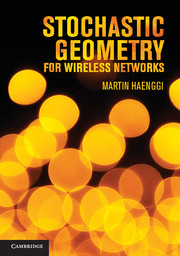Book contents
- Frontmatter
- Contents
- Preface
- Notation
- Part I Point process theory
- 1 Introduction
- 2 Description of point processes
- 3 Point process models
- 4 Sums and products over point processes
- 5 Interference and outage in wireless networks
- 6 Moment measures of point processes
- 7 Marked point processes
- 8 Conditioning and Palm theory
- Part II Percolation, connectivity, and coverage
- Appendix Introduction to R
- References
- Index
3 - Point process models
from Part I - Point process theory
Published online by Cambridge University Press: 05 November 2012
- Frontmatter
- Contents
- Preface
- Notation
- Part I Point process theory
- 1 Introduction
- 2 Description of point processes
- 3 Point process models
- 4 Sums and products over point processes
- 5 Interference and outage in wireless networks
- 6 Moment measures of point processes
- 7 Marked point processes
- 8 Conditioning and Palm theory
- Part II Percolation, connectivity, and coverage
- Appendix Introduction to R
- References
- Index
Summary
Introduction
In this chapter, we introduce four additional point process models: cluster processes, hard-core processes, Cox processes, and Gibbs processes. Poisson point processes exhibit complete spatial randomness due to their independence property. Cox processes model less regular spatial distributions – they are overdispersed relative to PPPs, which means that the ratio of the variance of the number of nodes in a set to its mean is larger than 1. Gibbs processes, on the other hand, may be overdispersed or underdispersed.
Figure 3.1 illustrates the two directions along which a point process model may depart from the point of complete spatial randomness, the PPP. In terms of the J function introduced in Definition 2.40, regular processes have J values larger than 1, since the probability of having a nearby neighbor is small; conversely, clustered processes have J values smaller than 1.
General finite point processes
A general finite point process is a generalization of the binomial point process to a process where the total number of points is itself a random variable. Compared with a random vector, there are three differences: The randomness of the number of points and the facts that the point process is unordered and simple and thus is better represented as a set.
Information
- Type
- Chapter
- Information
- Stochastic Geometry for Wireless Networks , pp. 47 - 76Publisher: Cambridge University PressPrint publication year: 2012
